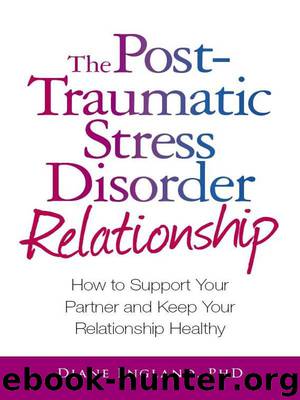The Post Traumatic Stress Disorder Relationship by Diane England

Author:Diane England
Language: eng
Format: epub
Tags: ebook, book
Publisher: Adams Media, Inc.
Published: 2009-07-15T00:00:00+00:00
Chapter 8
Change Your Thinking
Irrational Belief #1
Irrational Belief #2
Irrational Belief #3
Irrational Belief #4
Irrational Belief #5
Irrational Belief #6
Irrational Belief #7
Irrational Belief #8
Irrational Belief #9
Irrational Belief # 10
Irrational Belief # 11
Irrational Belief # 12
Some partners of PTSD sufferers have come to feel better about their relationships not because their partners improved significantly, but because of the actions that they themselves took. There’s a saying that it isn’t what happens to you that’s important, but rather the meaning you attach to what happens to you. In other words, what do you tell yourself about what’s happening? What is your self-talk?
Psychiatrist Dr. Albert Ellis came to realize that many people essentially undermine their chances for happiness by adhering to beliefs that he came to label as irrational. He identified a dozen of these that caused people to engage in self-talk that resulted in their experiencing some type of strong negative emotion. Whether it was anger or sadness, for example, adherence to one or more irrational beliefs kept these people from experiencing or enjoying the type of lives they undoubtedly wanted.
You face challenges being with a partner with PTSD. The thing is, if you are clinging to one or more of these irrational beliefs, you may be struggling more with this relationship than you need to be. If you can let go of any irrational beliefs you may have and replace then with more rational ones instead, you could completely change how you perceive your relationship. And as a result, you may come to feel better about it without your partner doing anything at all.
Let’s look at the irrational beliefs that Dr. Ellis identified.
Irrational Belief #1: I Have Certain Needs
That Must Be Met
While everyone has a few basic needs to ensure survival, most “needs” could be classified as wants. They’re things we’d prefer to have, but it isn’t life-threatening to be deprived of them. Nonetheless, we turn them into matters of life and death. By doing so, we become miserable when we can’t attain or sustain what was desired. If circumstances change and demand we give up something we believe we need, we’re apt to experience great distress. Whatever gifts the present offers are totally ignored.
Has this irrational belief infiltrated your life because of your partner’s PTSD? There may be things you’ve perceived as needs that are no longer being met—such as having sex so many times a week. If you want to support your partner and sustain the relationship, try to start thinking of these things as preferences or wants instead of absolute needs. As you do this, you might discover a more flexible or accepting side of yourself that has remained a stranger.
Irrational Belief #2: I Can’t Stand Certain
Events or Things
When you cling to this belief, you make it difficult to accomplish what you must. You may get worked up or emotional about things you can’t control—such as the fact your partner has PTSD. Your negative response won’t correct the situation, but it will make it more difficult to tolerate what’s going on in the present.
Download
This site does not store any files on its server. We only index and link to content provided by other sites. Please contact the content providers to delete copyright contents if any and email us, we'll remove relevant links or contents immediately.
| Grief & Bereavement | Hospice Care |
| Pet Loss | Suicide |
They Both Die at the End by Adam Silvera(8612)
Thirteen Reasons Why by Jay Asher(7788)
The Space Between by Michelle L. Teichman(6088)
Suicide Notes by Michael Thomas Ford(4273)
Tuesdays with Morrie by Mitch Albom(3832)
Suicide: A Study in Sociology by Emile Durkheim(2610)
The Checklist Manifesto by Atul Gawande(2204)
Tuesdays With Morrie by Mitch Albom(2173)
Robin by Dave Itzkoff(2006)
In the Woods by Tana French(1997)
Bossypants by Tina Fey(1987)
No Ashes in the Fire by Darnell L Moore(1982)
Reservoir 13 by Jon McGregor(1852)
End of Days by Sylvia Browne(1825)
Olive Kitteridge by Elizabeth Strout(1790)
Bus on Jaffa Road by Mike Kelly(1785)
All Things New by John Eldredge(1782)
Scar Tissue by Anthony Kiedis(1771)
No Time to Say Goodbye(1760)
